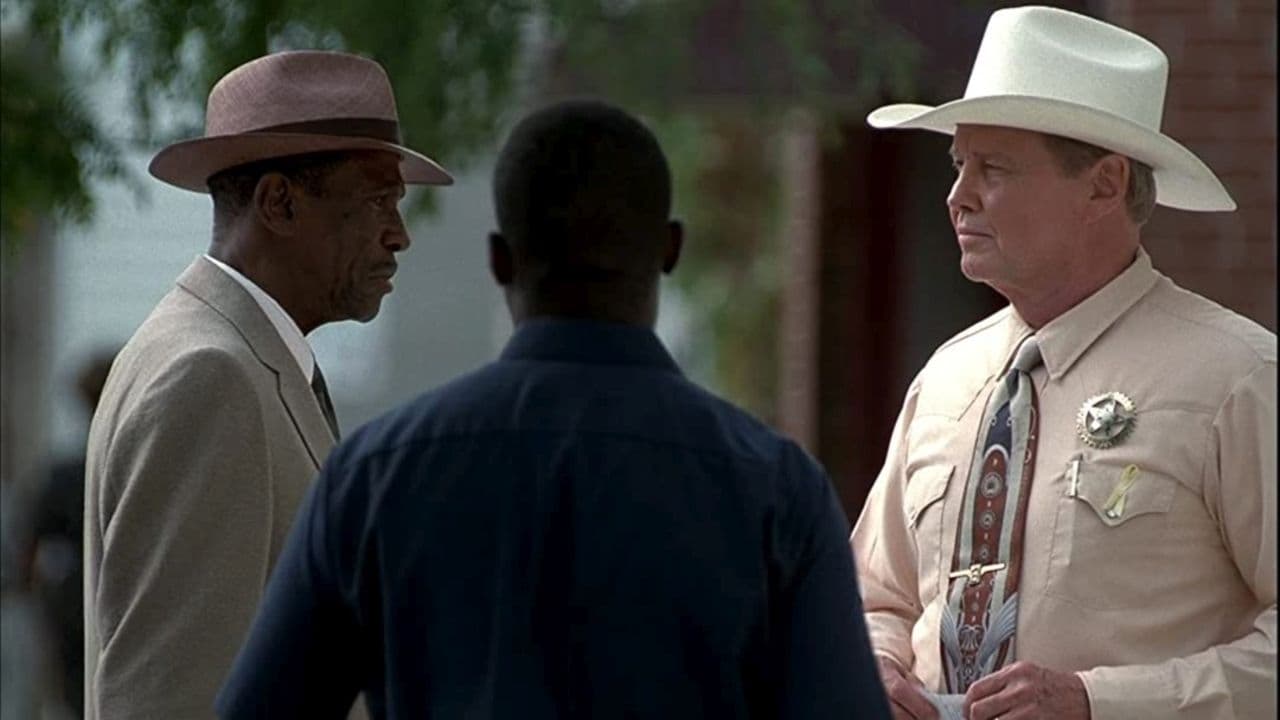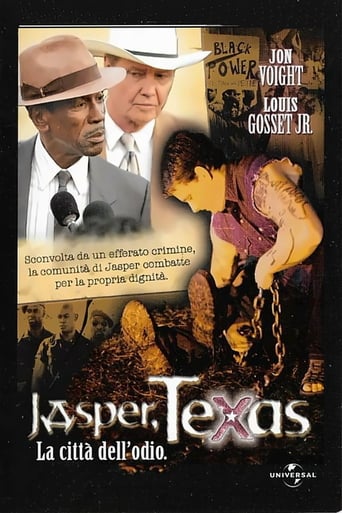

Terrible acting, screenplay and direction.
... View MoreA film with more than the usual spoiler issues. Talking about it in any detail feels akin to handing you a gift-wrapped present and saying, "I hope you like it -- It's a thriller about a diabolical secret experiment."
... View MoreThis is a gorgeous movie made by a gorgeous spirit.
... View MoreWhile it is a pity that the story wasn't told with more visual finesse, this is trivial compared to our real-world problems. It takes a good movie to put that into perspective.
... View MoreI live in Jasper, Texas. I was born and raised here, and this was one inaccurate movie. I liked the cast of characters, but they definitely made the town look like a small hick town that is not current, and it is nothing like that. I thought that Jon Voight, and Louis Gossett Jr. gave great performances. I also didn't like the fact that they showed the dragging so violently. Many of us here were reminded of how horrible it was. It is behind us, and that is where we would like to keep it. Overall I did not enjoy this movie. I have seen it twice, and I really doubt that I will watch it again. I feel that many people would be greatly surprised if they ever came to Jasper. It is nothing like it is portrayed in this movie.
... View MoreIn 1998 three young White men killed James Byrd, Jr., a Black man, by chaining Byrd to the back of their pickup truck, and then driving away at high speed down a back road in rural deep East Texas. It was a horrible crime, one that was quickly and easily solved. This film tells the story of that real-life event ... sort of.The best part of "Jasper, Texas" is the performance of Jon Voight, as sheriff Billy Rowles, who investigated the crime. The film also presents a credibly downbeat atmosphere of rural eastern Texas. That said, I was disappointed with the screenplay. The story begins on the day after the killing and, except for occasional flashbacks, moves forward, to chronicle the aftermath of the event, from the viewpoint of the town's residents. What was a terrible personal tragedy is turned into a speech-athon on race relations from: local politicians, the FBI, a citizen's task force, the Black Panthers, a White supremacy group, and others. The film's cast is way too large, and the dialogue is inflated. And throughout this talky film, there's the usual obnoxious behavior of the vulturous news media.We never really get to know James Byrd, Jr., ... the victim. He is almost irrelevant. Nor do we get any insight into the motivations of the three killers. The film thus mostly ignores the most relevant people, and chooses instead to tell the story of background people who talk endlessly around a sociology topic that has been talked to death. The entire film seemed academic, impersonal, and emotionally uninvolved.
... View MoreIn the movie, it is stated that the Bible says "An eye for an eye." There is, first of all, the old saying that an eye for an eye leaves the whole world blind, but I think a more important concern is that an eye for an eye being applied in this case would lead to three "death by dragging" convictions. That would be a pretty bad publicity stunt, to put it mildly, even though the three men who would do something like that to someone do not deserve to live. My thought during the movie was that George W. Bush was the governor at the time, and he famously stated that he gave an average of 15 minutes of consideration to each case before approving a death sentence.Jasper, Texas is a brilliant TV movie about the horrendous dragging death of James Byrd in 1998, as well as the staggering ineptitude of the government, brought on by conflicting policies. The movie, for example, certainly doesn't believe in the boundlessness of the Second Amendment. There are extensive scenes where the immediately likable but barely literate town sheriff, played brilliantly by Jon Voigt, struggles to convince the Black Panthers not to bring guns to their demonstration outside the courthouse, but is rendered powerless by their right to bear arms.True, they have the right to bear arms, but do they have the right to incite violence? To instigate a riot? These are both avenues by which the sheriff could have forbidden them by law from appearing armed in front of the courthouse, but chose to ignore them or was unaware that he had the power to stop people from inciting violence, an intention which the Black Panthers and KKK made no effort to hide. The Black Panthers plan a demonstration outside the courthouse to rival the KKK, a group of backward lunatics who also organized a demonstration. I didn't even know the KKK still existed, this is a group whose beliefs are so absolutely archaic that it is indeed heartbreaking to know that there are still people in this very country, in the 21st century, who still adhere to them. It's pathetic. But the Black Panthers, as this movie shows, are no less racist than the KKK.The trial scenes in the film are great, although we only see the trial of one of the three men involved in the murder, and at one point the dirtbag defense attorney objects, saying that no chain has been introduced as evidence. I would have thought that he would have been well aware of the fate of the chain used to kill James Byrd, at least from the prosecuting attorney, since both sides are required by law to reveal to the other side the details of their respective cases. Also, in one scene, as a friend of the murderer reads to the court a letter that he wrote her in which he says "white is right," he mouths the words along with her and then grins, proud of his racist wit but apparently unaware that he is helping to cement his conviction. We didn't need that. We know the guy's guilty.The movie makes it very clear, however, that it is the media that creates the real trouble with things like this. There is one reporter who would constantly ask questions designed to make the interviewee uncomfortable of back them into a corner. Every time this woman opened her mouth I wished someone would take that microphone and shove it in. It's an interesting parallel that blacks and whites work together on this case and are friends with each other outside of work, but the people that they represent seem completely divided. In one scene, however, we learn that racism exists on all levels, and the movie ends with a sign that racism will go on. It's odd that there is all of this talk about whether or not the town is a racist town, which might be hard to prove even given the heinous murder that took place went unpunished since the town has a black mayor. Although the trial resulted in the right decision, it is clear at the end of the movie that the race situation might be worse off than it was before. I like to think that the human race is headed in the right direction, though.
... View MoreAside from the Lifetime comparison this is a pretty decent dramatization of the terrible crime in Jasper. Really believable performances by both Jon Voight (with quite a believable Southern accent, similar to Bill Clinton's) and Louis Gossett, Jr. This would probably have been much more intense as a major motion picture theatrical release, but it's worth checking out as it is. In a couple of brief scenes, the film interjects real news clips of Bill Clinton and others speaking about the incident.
... View More